North American Mitchell, FL214, Fourmilehouse, Roscommon
On the side of a road in Cloonconny townland County Roscommon,
as you travel from Strokestown to Four Mile House, you can see
the following memorial stone:
The inscription reads:
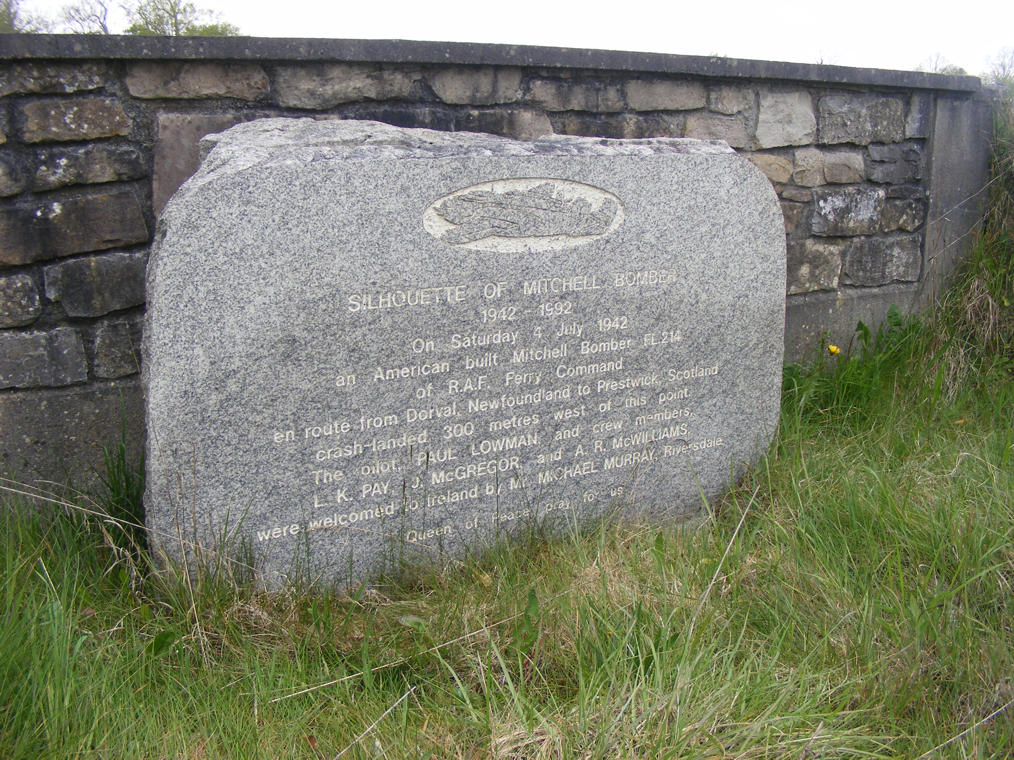
1942-1992
on Saturday 4 July 1942
an American built Bomber FL214
of R.A.F. Ferry Command
en route from Dorval, newfoundland to Prestwick, Scotland
crashlanded 300 metres west of this point.
The pilot PAUL LOWMAN and crew members
L.K. PAY, J McGREGOR and A. R. McWILLIAMS
were welcomed to the Ireland by Mr. MICHAEL MURRAY, Riversdale
Queen of Peace pray for us.
John Quinn from Antrim was able to determine the name of the
pilot during his 1992 research and he includes a chapter on the
crash, research and the ceremony in his book, Down in a Free
State. At that time, the remaining crew members names were not
fully confirmed.
The following photo of Mitchell FL214 was kindly provided by Roscommon County Museum. One can see the damage described in the Irish Army report.
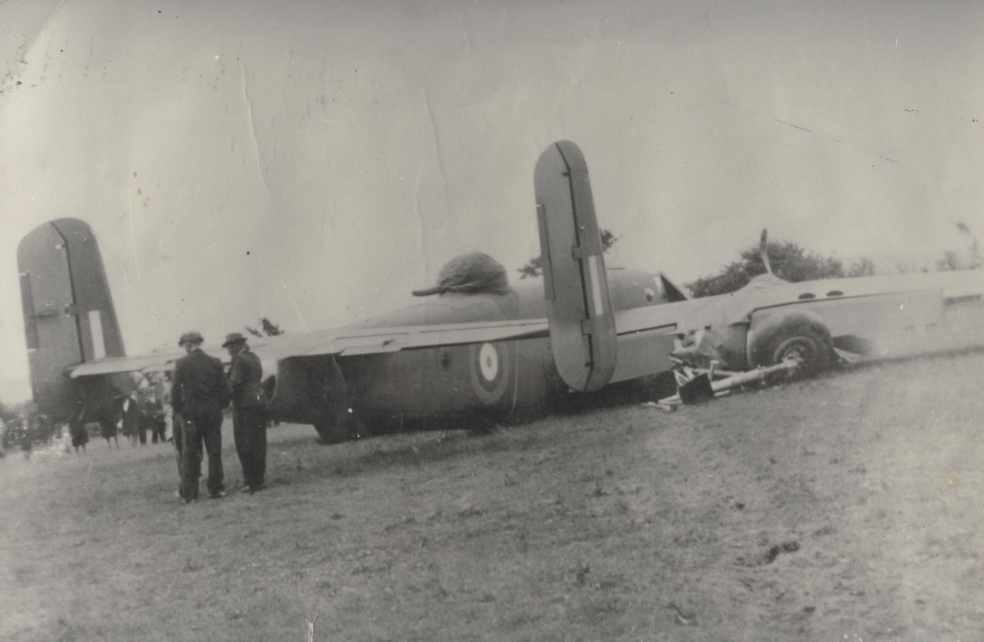
It was from correspondence with the Directorate of History and Heritage in Canada that the names of the men began to become clearer.
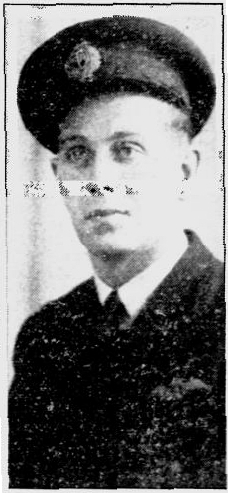 Paul Lowman
was contacted in 1992 by the locals of Four Mile House and John
Quinn. At that time Paul was able to reveal that his wartime
career began with his traveling to England in the winter of
1940/1941 where he joined the ranks of the Air Transport
Auxiliary, the ATA. This organisation was used to ferry aircraft
around the United Kingdom from factories to RAF depots and
airfields and spared trained RAF service pilots for front line
duty. His name appears on the passenger list of the ship, HMT
Leopoldville docking in Liverpool around the 11th of January
1941. The newspaper in the town he came from, the Warsaw Daily
Union, eagerly reported on his activities overseas at this time.
Paul Lowman
was contacted in 1992 by the locals of Four Mile House and John
Quinn. At that time Paul was able to reveal that his wartime
career began with his traveling to England in the winter of
1940/1941 where he joined the ranks of the Air Transport
Auxiliary, the ATA. This organisation was used to ferry aircraft
around the United Kingdom from factories to RAF depots and
airfields and spared trained RAF service pilots for front line
duty. His name appears on the passenger list of the ship, HMT
Leopoldville docking in Liverpool around the 11th of January
1941. The newspaper in the town he came from, the Warsaw Daily
Union, eagerly reported on his activities overseas at this time.
Paul Lowman was well known in his local area before the war and indeed all over America. In 1938 his name appeared in publications all over the country following his teaching of a Lion to use a hydrofoil! It's best to let this extract from the magazine Popular Science explain!
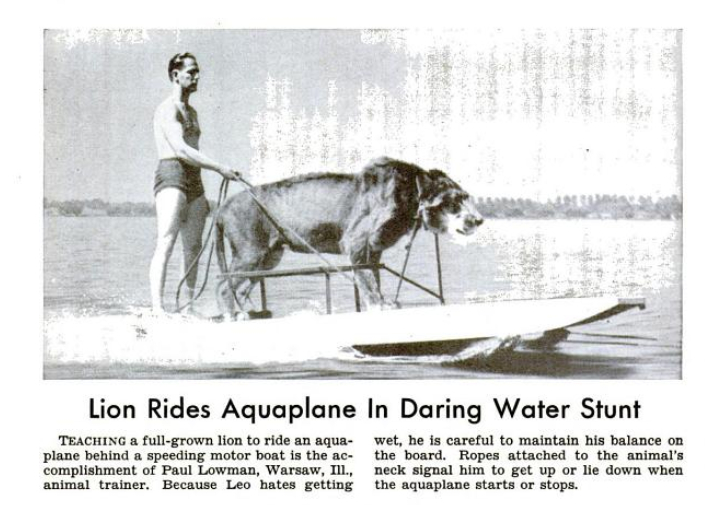
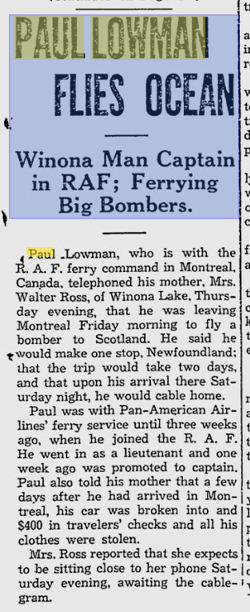
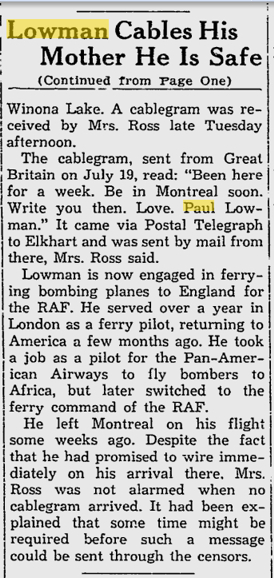 By
July 1941, Paul was talking about returning to the US after his
ATA contract was up in December 1941. One does wonder if he
meant for his family too publish his letters in the paper. His
letters home discuss his experiences serving over seas as a
civilian contractor in a war situation. He wonders in the
letters if he will serve a further term with the ATA. In the end
he decided not too and returned to America taking a position
with Pan American Airways but weeks later joined the RAF Ferry
Command in Montreal, Canada. The ever reliable Warsaw Daily
Union tracked his progress on his transatlantic endeavors with
the article at left. This appeared in the July 3rd, 1942 edition
of the paper! To his mothers undoubted relief, he cabled his
mother on July 19th to tell her he had arrived safe. After this
unfortunate start to ferrying, Paul went on to deliver aircraft
to many varied places, much like his crew as described below.
After the war, his local paper again faithfully reported his
post war activities as a flying instructor. After that he joined
National Airlines as a pilot. 1992 would of course see him back
in Cloonconny unveiling the memorial stone with his family. Paul
Lowman passed away in Florida on 9 December 2002.
By
July 1941, Paul was talking about returning to the US after his
ATA contract was up in December 1941. One does wonder if he
meant for his family too publish his letters in the paper. His
letters home discuss his experiences serving over seas as a
civilian contractor in a war situation. He wonders in the
letters if he will serve a further term with the ATA. In the end
he decided not too and returned to America taking a position
with Pan American Airways but weeks later joined the RAF Ferry
Command in Montreal, Canada. The ever reliable Warsaw Daily
Union tracked his progress on his transatlantic endeavors with
the article at left. This appeared in the July 3rd, 1942 edition
of the paper! To his mothers undoubted relief, he cabled his
mother on July 19th to tell her he had arrived safe. After this
unfortunate start to ferrying, Paul went on to deliver aircraft
to many varied places, much like his crew as described below.
After the war, his local paper again faithfully reported his
post war activities as a flying instructor. After that he joined
National Airlines as a pilot. 1992 would of course see him back
in Cloonconny unveiling the memorial stone with his family. Paul
Lowman passed away in Florida on 9 December 2002.
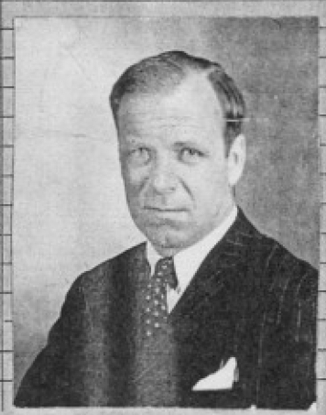 Leif Kaare Pay
had a varied career prewar. He is mentioned in mid 1930's
Singapore newspapers as being an aviator and had constructed an
airstrip on his Ulu Bernam estate. In March 1939, he and a
colleague took off from Kuala Lumpur en route to Copenhagen.
This was reported in The Straits Times newspaper of Singapore.
he was flying his own DH Hornet Moth aircraft and they planned
to fly via Siam (Thailand), Burma, India, Turkey, Germany and
thence to Denmark. Their arrival in Copenhagen was announced in
the same newspaper on 14 May 1939. Mr Pay was no stranger to
long distance flying. These articles can be found on the newspapers.nl.sg website.
His Ferry Command/Transport Command record card shows his
crewing up on at least 25 deliveries of Liberator, Mitchell,
Catalina and a mix of other types. He was First Officer on these
flights between 1942 and 1945. He delivered many of the
Liberators to the Middle East and to the Far East. After his
landing in Ireland, he was returned very quickly to Canada by
the Return Ferry Service. This used Liberator bombers as
transports to return selected ferry crews back across the
Atlantic. He made two further flights that month, taking another
B-25, FL696, from Houston to UK although the card is a little
unclear. It is not known what became of L K Pay after the war
but some evidence shows that he returned to Denmark and may have
continued flying. Danish aviation historian, Mikkel Plannthin
has a page
about Mr. Pay on his website commemorating Danish aviation
during the Second World War.
Leif Kaare Pay
had a varied career prewar. He is mentioned in mid 1930's
Singapore newspapers as being an aviator and had constructed an
airstrip on his Ulu Bernam estate. In March 1939, he and a
colleague took off from Kuala Lumpur en route to Copenhagen.
This was reported in The Straits Times newspaper of Singapore.
he was flying his own DH Hornet Moth aircraft and they planned
to fly via Siam (Thailand), Burma, India, Turkey, Germany and
thence to Denmark. Their arrival in Copenhagen was announced in
the same newspaper on 14 May 1939. Mr Pay was no stranger to
long distance flying. These articles can be found on the newspapers.nl.sg website.
His Ferry Command/Transport Command record card shows his
crewing up on at least 25 deliveries of Liberator, Mitchell,
Catalina and a mix of other types. He was First Officer on these
flights between 1942 and 1945. He delivered many of the
Liberators to the Middle East and to the Far East. After his
landing in Ireland, he was returned very quickly to Canada by
the Return Ferry Service. This used Liberator bombers as
transports to return selected ferry crews back across the
Atlantic. He made two further flights that month, taking another
B-25, FL696, from Houston to UK although the card is a little
unclear. It is not known what became of L K Pay after the war
but some evidence shows that he returned to Denmark and may have
continued flying. Danish aviation historian, Mikkel Plannthin
has a page
about Mr. Pay on his website commemorating Danish aviation
during the Second World War.
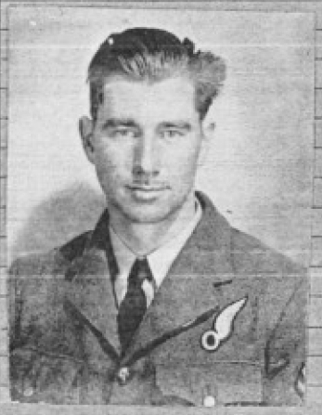 Flight
Sergeant Roderick James MacGregor R105529 was born
in 1916 in Barrhead, Alberta. He was married during his time
with Ferry Command, Transport Command.
The flight with Mitchell FL214 appears to have been his first
transatlantic flight and he was back in North America on July
27th, sailing into New York. His subsequent wartime career would
see him deliver a good number of aircraft to South Africa and
the Middle East, with one flight to India for good measure.
Flight
Sergeant Roderick James MacGregor R105529 was born
in 1916 in Barrhead, Alberta. He was married during his time
with Ferry Command, Transport Command.
The flight with Mitchell FL214 appears to have been his first
transatlantic flight and he was back in North America on July
27th, sailing into New York. His subsequent wartime career would
see him deliver a good number of aircraft to South Africa and
the Middle East, with one flight to India for good measure.
Roderick trained at 2 Air Navigation School during 1941 and
1942. He was later commissioned in May 1943 as an officer
in the RCAF, gaining the new service number CAN/J35953 and in
1946 was transferred to the reserve of the Air Force. His
service summary indicates that he was posted to the United
Kingdom in July 1944. The operational record book
for 246 Squadron of the RAF show him being both posted into that
unit from 1332 Heavy Conversion Unit and out again to 511
Squadron during the month of March 1945. There is no
obvious mention of him flying with them and 246 Squadron
and 511 Squadron co-operated a lot due to lack of 246
personnel. He was posted to 511 Squadron in September
1945,but soon after onward to 437 (RCAF) Squadron in October
1945.
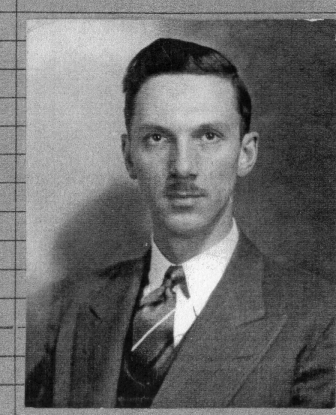 Arthur Reginald MacWilliams was 25 at the
time of the landing in Roscommon. He came originally from Prince
Edward Island, one of the provinces of Canada. Arthur was a
civilian contractor with the ferry operation. It was possible to
trace Arthur using shipping records during the war, on at least
two occasions he arrived in New York from Gourock in Scotland.
He was a radio operator and some of these operators had been
members of the telegraph service before the war, volunteering to
act as the vital radio operator on the dangerous transatlantic
ferry routes.
Arthur Reginald MacWilliams was 25 at the
time of the landing in Roscommon. He came originally from Prince
Edward Island, one of the provinces of Canada. Arthur was a
civilian contractor with the ferry operation. It was possible to
trace Arthur using shipping records during the war, on at least
two occasions he arrived in New York from Gourock in Scotland.
He was a radio operator and some of these operators had been
members of the telegraph service before the war, volunteering to
act as the vital radio operator on the dangerous transatlantic
ferry routes.
Only days after his landing in Roscommon and after returning to
Canada as a passenger in the belly of Liberator AM262 of the
Return Ferry Service, Arthur was crewing on a Ventura bomber
being flown near Lachine, Montreal on 14 July 1942 when it
crashed. Luckily, all four crew members survived albeit
with varying degrees of burns.
Arthur's injuries would see him endure a year of recovery, but
he was able to return to flying duties in September 1943.
This was the same aircraft on which Sgt Karl Dzinkoski RCAF was
also badly burned, Karl having ended up making a similar landing
in Donegal in June
1942.
His return to flying duties would see him carry out a further
year of round the world deliveries to the UK and African
destinations.
He passed away in February 1973 in Halifax, Nova Scotia aged just 56.
The Roscommon county museum was kind enough to share the
following photos and artifacts from their collection:
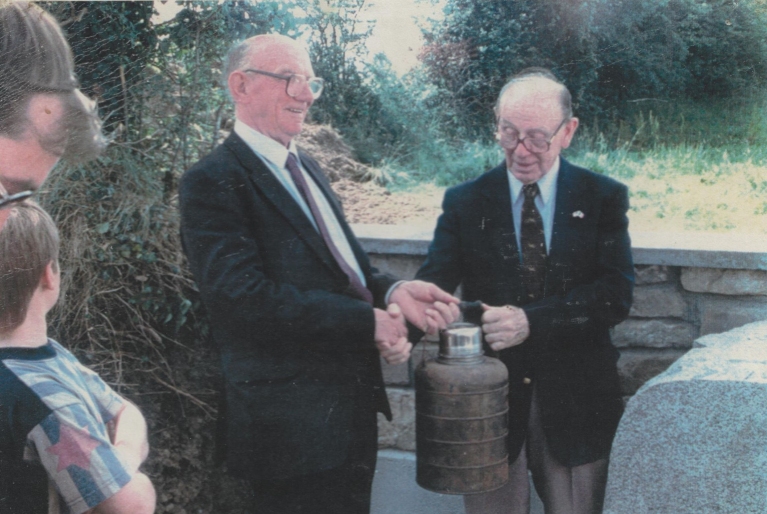
1. Photograph of Michael Murray, left, and pilot Paul Lowman at the 1992 commemoration with the Stanley Thermal Jug from FL214.
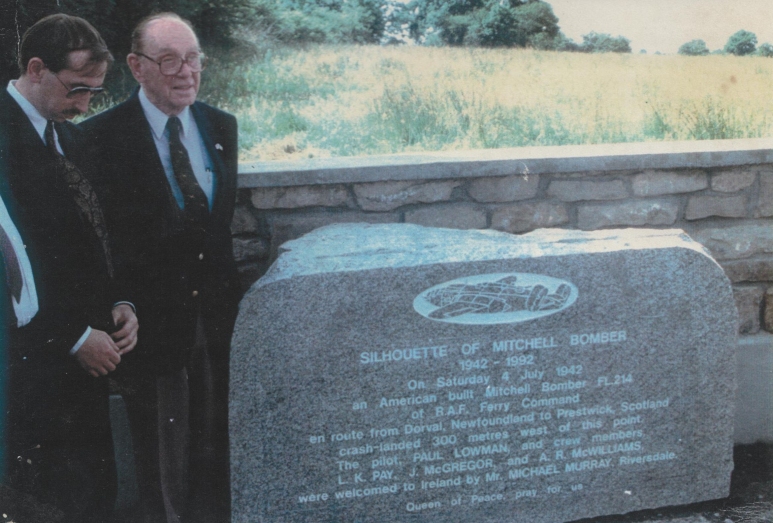
2. Photograph of Paul Lowman and researcher John Quinn at the
1992 Commemoration
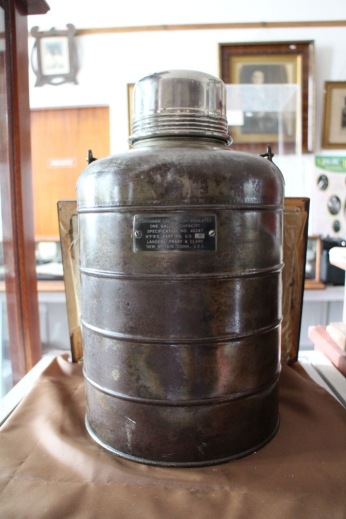
3. Photograph of a "Stanley Thermal Jug" flask from the
Mitchell Bomber which is on display in the museum. This
was a item delivered on long range aircraft as a means of
providing hot beverages for crews. The jug was a 1 gallon
capacity and was manufactured by Landers, Frary & Clark,
of New Britain, Connecticut.
The photo of Pay, MacGregor and MacWilliams were sourced from
the DHH, Canada

